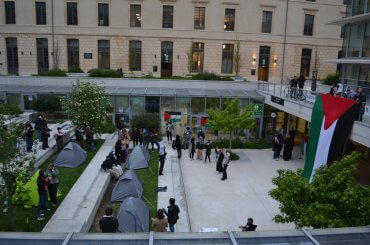Yesterday I did a post on Roger Cohen’s piece that used the Polish air-crash tragedy, and the Russian response to it as evidence that all intractable struggles can be healed–and Israel and Palestine should learn something about giving up historical grievance. Mark Wauck, who is of Polish ancestry, commented to me on it, and I asked him about the Polish experience and whether it’s a lesson for the Middle East.
The response of the Russians – showing Wajda’s film [about the Katyn massacre by the Russians at the beginning of WW2] on prime time gov’t tv, etc. – has been heartening and has deeply impressed the Poles. Good may come of this yet. Poland could ultimately unite Russia to the west and help Russia overcome its own tragic history.
I’ve read so much about this Polish thing that I’m on overload right now. One remark that I recall but can’t place spoke of the Russian outpouring of sympathy for Poland as not only freeing them from their past attitudes toward Poland but also – because of the unique nature of Katyn in history – as perhaps freeing the Russians to confront their own history. And that was not meant invidiously, as if anti-Polishness is the sum total of Russian history, or as if there isn’t another side to that narrative as well. Katyn was an NKVD execution site [Russian secret police] years before the tens of thousands of Polish officers were shot in the backs of their heads and dumped into pits. Some (like Putin) say that the Russian dead at Katyn even greatly outnumber the Poles. The symbol of the geographically-shared tragedies and the bodies in the common pits is very powerful.
However, as important is the gradual recognition that both countries need a way forward and that they can help each other. Over the years I’ve been impressed with the willingness of the Poles to forgive Germans and Russians if those nations can accept Poland. The time may be coming when that is reciprocated. Remember though how long this has taken. Poles have had to accept an empowered Russia (after centuries when Poland was regional top dog) and now Russians have had to become accepting of an empowered Poland again – at least to a degree. Not easy. I think WWII and the Cold War finally convinced most Poles that there was no going back, that nationalist Romanticism was a dead end. And now they’re finding that the future is bright, after a helluva slog through history. Perhaps that example has stirred something in the Russian soul.
I’m afraid the situation in the Middle East isn’t ready for that. It’s clear to me that Muslims can’t accept empowered Jews. I believe there are other reasons for that than simply Palestinian grievances. The increased intolerance toward the two millenium old Christian ME communities is surely an indication – especially as that intolerance is accompanied by a shocking degree of historical ignorance that cannot be overcome in less than generations. You’re a better judge of whether Jews can become more accepting of their own history rather than wrapping it in mythology (as Poles and Russians have done for so long re their own histories – think of Poland’s self identification as the crucified nation, etc. Mythology serves a legitimate purpose, especially when national survival is the issue, but at some point it can also become self destructive.) In coming to terms with their own history, Jews will need to see "the other" more clearly as well. Since I mostly interact with Zionist types, I’d have to say that I see hardly any promising signs. The denial is almost complete. You’ll have to judge of the larger community. Certainly there appear to be some Israeli voices (Burg, Sands) of reason, but can even they elicit a response from either warring side? A tall order, and reason for pessimism for some time to come.

